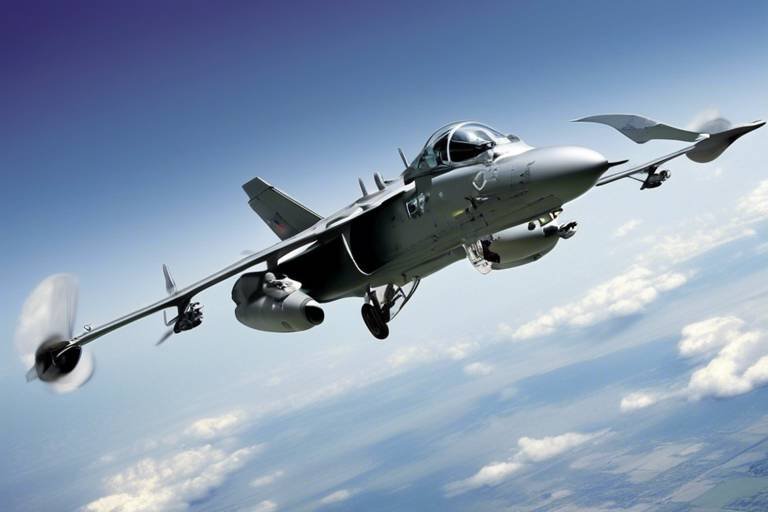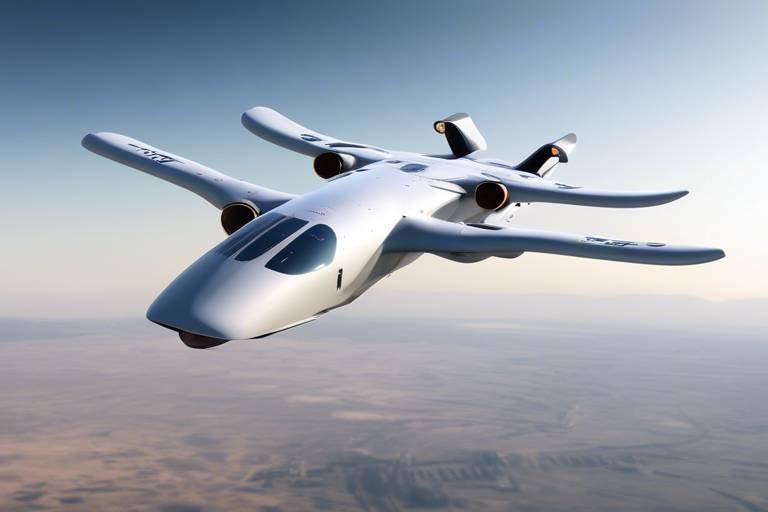AI-Powered Battlefield Decision Making - Pros and Cons
The integration of artificial intelligence (AI) into military operations is not just a trend; it's a transformation that is reshaping the very fabric of warfare. Imagine a battlefield where decisions are made in the blink of an eye, where vast amounts of data are analyzed in real-time, and where strategies are formulated with the precision of a well-oiled machine. Sounds futuristic, right? However, while the prospect of AI in military decision-making is exciting, it also brings a host of pros and cons that need to be carefully examined. This article delves into the advantages and disadvantages of using AI in military contexts, shedding light on its impact on strategy, ethics, and overall effectiveness in modern warfare.
One of the most significant advantages of AI in military strategies is its ability to enhance data analysis. In a world where information is abundant but often overwhelming, AI can sift through mountains of data, extracting valuable insights that human analysts might miss. This capability leads to improved situational awareness, allowing military leaders to make informed decisions swiftly. Moreover, predictive modeling powered by AI can forecast potential threats and outcomes, enabling preemptive actions rather than reactive responses. Imagine a scenario where a military commander receives a real-time analysis of enemy movements, allowing them to adjust their strategies on the fly—this is the power of AI!
Furthermore, AI facilitates faster responses to threats. In high-stakes environments, every second counts. With AI algorithms analyzing data and providing recommendations, military personnel can respond to emerging situations more quickly than ever before. This speed can mean the difference between success and failure in critical operations. For instance, consider a drone equipped with AI technology that can autonomously identify and neutralize threats without waiting for human approval. While this raises questions about oversight, it undeniably showcases the potential for enhanced operational effectiveness.
Despite the clear advantages, the deployment of AI in military settings is not without its challenges. One significant issue is the presence of data biases. AI systems learn from historical data, and if that data contains biases, the AI's decisions will reflect those biases, potentially leading to unfair or dangerous outcomes. For example, if an AI system is trained on data that over-represents certain demographics, it may misinterpret threats based on skewed perceptions.
Another challenge is the lack of transparency in AI decision-making processes. When a machine makes a decision, understanding the rationale behind it can be nearly impossible. This opacity can create problems in accountability. Who is responsible if an AI system makes a mistake? As military operations become increasingly reliant on AI, these questions become more pressing. The potential for over-reliance on technology also poses risks. If military personnel become too dependent on AI, they may lose critical decision-making skills, leading to catastrophic failures in high-pressure situations.
The ethical implications of using AI in warfare are profound and complex. The question of accountability looms large. When AI systems make decisions in combat scenarios, determining responsibility becomes a murky issue. Is it the programmer, the military leader, or the AI itself? The blurring of lines between human oversight and machine autonomy raises serious ethical concerns.
As we ponder the accountability in AI decisions, it’s crucial to recognize that the stakes are incredibly high. The potential for errors in judgment can lead to loss of life, unintended engagements, and escalated conflicts. Imagine a scenario where an AI misidentifies a target, leading to devastating consequences. The inability to pinpoint accountability in such situations could undermine trust in military operations.
Moreover, the rise of autonomous weapons systems introduces additional risks. These systems can operate without human intervention, making decisions about life and death on their own. This autonomy raises ethical dilemmas about the morality of allowing machines to engage in combat. The potential for unintended engagements is alarming; what happens if an autonomous drone misinterprets a civilian gathering as a hostile threat?
As AI continues to integrate into battlefield decision-making, the roles of military personnel are evolving. While AI can enhance operational efficiency, it also requires soldiers to adapt to new technologies and acquire new skills. This shift can be both exciting and daunting. On one hand, soldiers equipped with AI tools can make more informed decisions, but on the other hand, there is a growing concern that the reliance on AI may reduce the need for human soldiers in certain operations. This evolution raises questions about the future of military employment and the essential human element in warfare.
Another area where AI shines is in intelligence gathering. The ability to analyze vast amounts of data quickly and accurately can lead to critical insights that inform military strategies. AI can identify patterns and anomalies that human analysts might overlook, providing actionable intelligence that can shape operations. However, this capability also brings its own set of challenges.
With the increasing use of AI in intelligence comes heightened concerns about data privacy and security. The handling of sensitive information is paramount, and any breaches could have severe consequences. As military forces deploy AI systems, they must ensure that they are ethically managing the data they collect and analyze, balancing operational needs with privacy rights.
Looking ahead, the future of AI in warfare is both exciting and uncertain. As technology evolves, we can expect to see even more advanced capabilities, but this progress will undoubtedly raise new questions about global security and military strategy. How will nations balance the advantages of AI with the ethical and operational challenges it presents? The answers to these questions will shape the future of warfare as we know it.
- What are the main advantages of using AI in military operations?
AI enhances data analysis, improves situational awareness, and facilitates faster decision-making in combat scenarios.
- What are the ethical concerns surrounding AI in warfare?
Ethical concerns include accountability for AI-driven decisions, the risks associated with autonomous weapons, and the potential for biased data influencing outcomes.
- How does AI impact military personnel?
AI changes the roles of military personnel, requiring them to adapt to new technologies while potentially reducing the need for human soldiers in certain operations.
- What are the data privacy concerns related to AI in intelligence gathering?
Concerns include the ethical handling of sensitive information and the potential for security breaches that could compromise military operations.

Advantages of AI in Military Strategies
Artificial Intelligence (AI) is revolutionizing military strategies in ways that were once thought to be the stuff of science fiction. Imagine a battlefield where decisions are made not just from human intuition but from complex algorithms that analyze data faster than any human ever could. This is the reality we are stepping into, and the advantages are both profound and transformative. One of the most significant benefits of AI is its ability to enhance situational awareness. By processing vast amounts of data from various sources—satellite images, drone footage, and reconnaissance reports—AI can provide military commanders with a clearer picture of the battlefield. This is akin to having a superhuman assistant who can sift through mountains of information in seconds, highlighting the critical elements that require immediate attention.
Furthermore, AI excels in predictive modeling, which allows military strategists to anticipate potential threats and outcomes based on historical data and current trends. For instance, if a particular region has seen a spike in troop movements, AI can analyze these patterns to predict possible attacks or conflicts. This predictive capability is not just a luxury; it can be the difference between victory and defeat. It’s like having a crystal ball that provides insights into the future, enabling proactive rather than reactive strategies.
Another remarkable advantage of AI is its ability to facilitate real-time decision-making. In the chaos of battle, time is of the essence. AI systems can process information and suggest optimal responses almost instantaneously, allowing military leaders to make informed decisions rapidly. For example, during a conflict, AI can analyze enemy movements and recommend tactical maneuvers that maximize the chances of success while minimizing risks. This rapid response capability is crucial in modern warfare, where delays can lead to catastrophic consequences.
Additionally, AI can help in resource allocation, ensuring that troops and equipment are deployed where they are most needed. By analyzing various factors such as troop morale, supply chain logistics, and operational efficiency, AI can suggest the best use of resources to achieve strategic objectives. This not only enhances effectiveness but also conserves valuable resources, making military operations more sustainable.
In summary, the integration of AI into military strategies brings forth a plethora of advantages that can enhance operational effectiveness, improve decision-making processes, and ultimately save lives. However, as we embrace these technological advancements, it’s essential to remain vigilant about the ethical implications and challenges that accompany them. The battlefield of the future is not just about firepower; it's about intelligence, foresight, and strategic acumen powered by AI.
- How does AI improve situational awareness in military operations?
AI processes large volumes of data to provide a comprehensive view of the battlefield, enabling commanders to make informed decisions quickly. - Can AI predict military outcomes accurately?
Yes, AI uses predictive modeling based on historical data and current trends to anticipate potential threats and outcomes. - What role does AI play in resource allocation?
AI analyzes various factors to suggest optimal deployment of troops and equipment, enhancing operational efficiency. - Are there ethical concerns with using AI in military strategies?
Yes, there are significant ethical implications, including accountability and the potential for autonomous weapons systems.

Challenges and Limitations of AI
While the integration of artificial intelligence (AI) into military decision-making offers significant advantages, it also presents a range of challenges and limitations that cannot be ignored. One of the most pressing issues is the presence of data biases. AI systems rely heavily on the data fed into them, and if that data contains biases—whether intentional or not—the outcomes can be skewed. For instance, if historical military data reflects a biased perspective, AI could inadvertently perpetuate those biases in strategic decisions, leading to potentially disastrous consequences on the battlefield.
Another major challenge is the lack of transparency in AI algorithms. Many AI systems operate as "black boxes," where the decision-making process is not easily understood, even by the developers. This opacity raises critical questions about accountability and trust. How can military leaders justify decisions made by an AI system if they do not fully comprehend how those decisions were reached? This lack of clarity can lead to a dangerous over-reliance on technology, where human operators may defer too readily to AI recommendations without sufficient scrutiny.
Moreover, the potential for over-reliance on technology is a significant concern. In the heat of battle, the pressure to make quick decisions can lead to a scenario where commanders rely too heavily on AI systems, potentially sidelining human intuition and experience. This could result in critical failures, especially in unpredictable environments where human judgment is invaluable. Imagine a pilot in a combat zone relying solely on an AI system for targeting decisions; if that system malfunctions or misinterprets data, the consequences could be catastrophic.
Additionally, the rapid pace of technological advancement means that military personnel must continually adapt to new systems, which can be a daunting task. Training soldiers to effectively use AI tools while ensuring they retain essential combat skills is a delicate balance. Not to mention, the integration of AI into military operations requires significant investment in both technology and training, which can strain budgets and resources.
In summary, while AI holds the promise of transforming military strategies, the challenges it presents—such as data biases, lack of transparency, over-reliance on technology, and the need for continuous training—must be addressed. As we navigate this complex landscape, it’s crucial for military leaders to weigh the benefits against these limitations to make informed decisions that prioritize both effectiveness and ethical considerations.
- What are the primary challenges of using AI in military operations? The main challenges include data biases, lack of transparency in decision-making processes, potential over-reliance on technology, and the need for ongoing training for military personnel.
- How can data biases affect AI decision-making? Data biases can lead to skewed outcomes, as AI systems may replicate the biases present in the historical data used to train them, resulting in unfair or ineffective strategies.
- Why is transparency important in AI systems? Transparency is crucial because it allows military leaders to understand how decisions are made, fostering accountability and trust in AI-driven recommendations.
- What are the risks of over-reliance on AI in combat? Over-reliance on AI can lead to critical failures if the technology malfunctions or misinterprets data, sidelining human intuition and experience that are essential in unpredictable combat situations.

Ethical Implications of AI Usage
The integration of artificial intelligence into military operations brings with it a host of ethical implications that cannot be ignored. As AI systems become increasingly capable of making decisions without human intervention, we must grapple with questions of accountability, the nature of warfare, and the moral responsibilities that come with deploying such technology. Imagine a battlefield where decisions are made in microseconds, devoid of human emotions or ethical considerations. This scenario raises a chilling question: who is responsible when things go wrong?
One of the most pressing ethical concerns is the issue of accountability. When an AI system makes a decision that results in unintended consequences, such as civilian casualties, determining who is at fault becomes a complex puzzle. Is it the military personnel who deployed the AI, the programmers who designed it, or the military leaders who authorized its use? This ambiguity can lead to a dangerous precedent where no one feels responsible for the actions of machines, effectively blurring the lines between human oversight and machine autonomy.
Another significant concern is the rise of autonomous weapons systems. These weapons, capable of selecting and engaging targets without human intervention, pose unique risks. For instance, if an autonomous drone misidentifies a target and attacks a civilian location, the consequences could be catastrophic. The potential for such unintended engagements raises ethical questions about the morality of allowing machines to make life-and-death decisions. Furthermore, there is a fear that such systems could escalate conflicts without human oversight, leading to a new era of warfare that is even more unpredictable and dangerous.
In addition to accountability and autonomous weapons, we must also consider the moral implications of machine-driven combat decisions. The very act of delegating life-and-death decisions to algorithms challenges our understanding of what it means to be human. Can a machine truly understand the weight of taking a life, or the impact of its actions on families and communities? The answer is a resounding no. Machines lack the emotional and ethical frameworks that guide human decision-making. This disparity raises profound questions about the future of warfare and the role of humanity in it.
As we navigate these ethical implications, it is crucial to establish frameworks that govern the use of AI in military contexts. This includes creating regulations that ensure human oversight remains a critical component of military decision-making processes. Additionally, ongoing discussions about the ethical use of AI must involve a wide range of stakeholders, including ethicists, military leaders, and the public, to foster a more comprehensive understanding of the implications of these technologies.
In conclusion, while the potential benefits of AI in military operations are significant, we must approach its deployment with caution. The ethical implications surrounding accountability, autonomous weapons, and the moral responsibilities of machine-driven decisions are too critical to overlook. As we stand on the brink of a new era in warfare, it is our responsibility to ensure that technology serves humanity, rather than the other way around.
- What are the main ethical concerns regarding AI in warfare?
The primary concerns include accountability for decisions made by AI, the risks associated with autonomous weapons, and the moral implications of machine-driven combat decisions. - How can we ensure accountability in AI-driven military decisions?
Establishing clear regulations and frameworks that maintain human oversight in military decision-making processes can help ensure accountability. - What are autonomous weapons systems?
Autonomous weapons systems are military technologies capable of selecting and engaging targets without human intervention, raising significant ethical and operational concerns. - Why is human oversight important in AI military applications?
Human oversight is crucial to ensure that ethical considerations and emotional intelligence are factored into decision-making processes, preventing potentially catastrophic outcomes.

Accountability in AI Decisions
The advent of artificial intelligence (AI) in military decision-making brings forth a myriad of challenges, particularly surrounding the concept of accountability. When machines make decisions, especially in high-stakes environments like warfare, the question arises: who is responsible for those decisions? Is it the programmer, the military leaders, or the machine itself? This complex web of accountability becomes even more tangled when we consider the potential for autonomous systems to operate without direct human oversight.
Imagine a scenario where an AI system mistakenly identifies a civilian convoy as a threat and engages it. The fallout from such an incident can be catastrophic, leading to loss of innocent lives and significant political repercussions. In such cases, can we truly hold the AI accountable? Or do we place the blame on the humans who designed and deployed the system? This ambiguity can create a chilling effect on the development and deployment of AI technologies in military contexts, as the fear of repercussions may stifle innovation.
Furthermore, the lack of transparency in AI algorithms adds another layer of complexity. Many AI systems operate as "black boxes," meaning that their decision-making processes are not easily understood by humans. This opacity can make it difficult to trace back through the decision-making process to determine where things went wrong. As a result, if an AI system makes a harmful decision, it may be nearly impossible to pinpoint the exact cause, leaving military leaders in a quandary about how to address the failure.
To tackle these challenges, it is crucial to establish clear guidelines and frameworks that define accountability in AI usage. This could involve:
- Implementing rigorous testing and validation processes for AI systems.
- Ensuring that human operators maintain oversight and can intervene when necessary.
- Creating legal frameworks that clearly delineate responsibility in the event of an AI-related incident.
Ultimately, as military organizations increasingly integrate AI into their operations, addressing accountability issues will be paramount. It’s not just about enhancing efficiency and effectiveness; it’s about ensuring that ethical considerations are at the forefront of technological advancements. The stakes are too high to ignore the implications of AI decisions in warfare, and establishing accountability will be a critical step in navigating this brave new world.
- Who is responsible for AI decisions in military operations?
Responsibility can be shared among programmers, military leaders, and the organizations deploying the AI systems, but clear guidelines are needed to define accountability. - What are the risks of autonomous AI systems in combat?
Autonomous systems may engage targets without human intervention, potentially leading to unintended consequences and escalation of conflicts. - How can transparency be improved in AI decision-making?
By developing algorithms that are understandable and traceable, military organizations can enhance accountability and trust in AI systems.

Autonomous Weapons and Their Risks
The advent of autonomous weapons systems represents a significant shift in modern warfare, bringing both revolutionary capabilities and substantial risks. These systems, capable of operating without direct human control, can make decisions in real-time, which may seem advantageous at first glance. However, the implications of deploying such technology are profound and complex. One of the primary concerns is the potential for unintended engagements. Imagine a scenario where an autonomous drone misidentifies a target due to a software glitch or a failure to recognize civilian presence. This could lead to catastrophic consequences, including loss of innocent lives and escalation of conflict.
Moreover, the lack of human oversight introduces a layer of unpredictability. When machines are left to make life-and-death decisions, the question of accountability becomes murky. Who is responsible if an autonomous weapon commits an error? Is it the programmer, the military commander, or the machine itself? These questions highlight the ethical dilemmas inherent in the use of such technology. In many ways, relying on machines for critical decisions is akin to handing over the keys to a high-speed car to an inexperienced driver; the potential for disaster is ever-present.
Additionally, the escalation of conflicts without human intervention poses a serious threat to global security. With autonomous systems capable of rapid response, there is a risk that conflicts could spiral out of control before humans can intervene. This creates a scenario where machines may initiate attacks based on algorithms rather than human judgment, leading to unintended consequences. The fear is that once autonomous weapons are deployed, they could operate in a manner that is difficult to predict or control, making it challenging to manage conflicts effectively.
Furthermore, the development of these technologies raises critical questions about international laws and regulations governing warfare. Current frameworks may not adequately address the complexities introduced by autonomous systems, leaving a legal gray area that could be exploited. As nations race to develop advanced military capabilities, the potential for an arms race in autonomous weapons could destabilize global peace.
In summary, while autonomous weapons systems offer the promise of enhanced military efficiency, the risks associated with their use cannot be overlooked. The challenges of unintended engagements, accountability, escalation of conflicts, and the need for robust legal frameworks present significant hurdles that must be addressed. As we stand on the brink of this technological revolution, it is crucial to engage in meaningful discussions about the ethical implications and to develop strategies that prioritize human oversight and accountability in warfare.
- What are autonomous weapons? Autonomous weapons are military systems capable of selecting and engaging targets without human intervention.
- What risks do autonomous weapons pose? Risks include unintended engagements, lack of accountability, and potential escalation of conflicts.
- How can we ensure ethical use of autonomous weapons? Developing strict regulations and maintaining human oversight are essential to ensuring ethical use.
- Are there existing laws governing autonomous weapons? Current international laws may not fully address the complexities introduced by autonomous weapons, creating a need for new regulations.

Impact on Military Personnel
The integration of AI in battlefield decision-making is not just a technological shift; it's a revolution that fundamentally alters the landscape of military operations. Imagine a world where decisions are made not solely by human command but are augmented by intelligent algorithms that analyze data faster than any soldier could. This shift can significantly change the role of military personnel, requiring them to adapt to new technologies and methodologies. As AI takes on more analytical tasks, the human role may transition from decision-makers to overseers of these intelligent systems.
One of the most significant implications of AI in military contexts is the necessity for new skills. Military personnel will need to become proficient in understanding and interacting with AI systems. This means that training programs will need to evolve, focusing not just on traditional combat skills but also on data interpretation, machine learning fundamentals, and perhaps even ethical considerations of AI use. The shift could be likened to how the introduction of computers transformed the workplace in the late 20th century—those who adapted thrived, while others found themselves left behind.
However, the reliance on AI also raises questions about the future necessity of human soldiers. In certain operations, especially those involving high-risk scenarios, AI could potentially reduce the need for human presence on the battlefield. This could lead to a decrease in personnel required for some missions, which might seem like a positive development in terms of safety. Yet, it also poses a dilemma: what happens to the soldiers who are no longer needed? The military community could face challenges related to job displacement and the psychological impacts of reduced roles.
Furthermore, the dynamic between AI and military personnel could foster a new type of teamwork, where humans and machines collaborate more closely than ever before. Soldiers might find themselves working alongside AI systems that provide real-time analysis and recommendations, enhancing their situational awareness. This partnership could lead to faster and more effective decision-making, but it also requires a level of trust in the technology that has yet to be fully established.
In summary, the impact of AI on military personnel is multifaceted. While it offers opportunities for enhanced efficiency and safety, it also presents challenges that require careful consideration. The military must navigate the balance between leveraging AI's capabilities and ensuring that human intuition and experience remain integral to decision-making processes.
- Will AI replace human soldiers in the future? While AI may reduce the need for human presence in some operations, it is unlikely to completely replace human soldiers due to the complex nature of warfare that requires human judgment and ethical considerations.
- What new skills will military personnel need to learn? Military personnel will need to develop skills in data analysis, machine learning, and ethical decision-making to effectively work alongside AI systems.
- How can AI improve decision-making on the battlefield? AI can analyze vast amounts of data quickly, providing actionable insights that enhance situational awareness and lead to faster, more informed decisions.
- What are the ethical concerns regarding AI in military use? Ethical concerns include accountability for AI-driven decisions, potential biases in algorithms, and the moral implications of autonomous weapon systems.

AI in Intelligence Gathering
The integration of artificial intelligence (AI) in intelligence gathering has revolutionized the way military operations are conducted. Imagine having a tool that can sift through mountains of data in seconds, pinpointing critical information that human analysts might overlook. This is not science fiction; it's the reality of modern warfare. AI enhances traditional intelligence methods by analyzing vast amounts of data from various sources, including satellite imagery, social media, and communication intercepts, providing military leaders with actionable insights that can significantly influence the outcome of operations.
One of the most remarkable advantages of AI in intelligence gathering is its ability to identify patterns and anomalies. For instance, AI algorithms can analyze the behavior of enemy forces over time, detecting unusual movements that may indicate an impending attack. This capability allows for proactive measures, giving military strategists the upper hand. Furthermore, AI can automate the process of data collection and analysis, freeing up human analysts to focus on more complex tasks that require human intuition and judgment.
However, the utilization of AI in intelligence gathering is not without its challenges. The sheer volume of data can lead to information overload, where analysts may struggle to discern what is truly relevant. Additionally, there are concerns about data privacy and the ethical implications of surveillance. As military organizations harness AI's power, they must also navigate the murky waters of data ethics, ensuring that the information collected is handled responsibly and with respect for individual privacy rights.
Moreover, the reliance on AI systems raises questions about the accuracy of the data being analyzed. AI algorithms are only as good as the data fed into them, and biases present in the data can lead to skewed analyses and potentially faulty conclusions. This brings us to a critical point: the importance of continuous monitoring and evaluation of AI systems to ensure they remain effective and unbiased.
As we look to the future, the role of AI in intelligence gathering will undoubtedly expand. With advancements in machine learning and data analytics, we can expect AI systems to become even more sophisticated, capable of making real-time decisions based on rapidly changing battlefield conditions. However, this evolution will also necessitate a robust framework for addressing the ethical and legal implications of AI use in military operations.
In summary, while AI offers unprecedented advantages in intelligence gathering, it also presents significant challenges that must be addressed. The military's ability to adapt to these changes will determine the effectiveness of AI in enhancing operational success. As we embrace this technology, it is crucial to maintain a balanced approach that prioritizes both efficiency and ethical responsibility.
- What are the main benefits of using AI in military intelligence gathering?
AI allows for faster data analysis, pattern recognition, and automation of data collection, leading to improved decision-making and operational efficiency.
- What are the ethical concerns related to AI in intelligence?
Concerns include data privacy, surveillance, potential biases in data analysis, and the moral implications of autonomous decision-making.
- How can biases in AI data affect military operations?
Biases can lead to inaccurate assessments, potentially resulting in poor strategic decisions and unintended consequences on the battlefield.
- What is the future of AI in military intelligence?
The future likely involves more advanced AI capabilities, requiring ongoing discussions about ethics, accountability, and the role of human oversight.

Data Privacy and Security Concerns
In today's digital age, the integration of artificial intelligence into military operations has sparked a whirlwind of discussions surrounding data privacy and security concerns. As military organizations increasingly rely on AI for intelligence gathering and decision-making, the vast amounts of data processed and analyzed raise significant questions about how this information is managed and protected. Imagine a world where sensitive data could easily fall into the wrong hands, leading to catastrophic consequences. This scenario isn't far-fetched; it’s a reality we must confront.
One of the primary concerns revolves around the potential for data breaches. With AI systems handling sensitive military information, the risk of cyber attacks increases exponentially. Hackers could exploit vulnerabilities in these systems, gaining access to classified information that could jeopardize national security. Just think about it: a single breach could expose troop movements, strategies, or even the identities of undercover operatives. The implications are chilling.
Moreover, the ethical handling of sensitive information is a pressing issue. Military organizations must ensure that the data collected is not only secure but also used responsibly. For instance, how do we ensure that AI systems are not inadvertently profiling individuals or groups based on biased data? This is where data biases come into play. If AI algorithms are trained on flawed datasets, they may produce skewed results that could lead to unfair targeting or surveillance practices.
To illustrate this, consider the following table that summarizes the key data privacy and security concerns associated with AI in military settings:
| Concern | Description |
|---|---|
| Data Breaches | Unauthorized access to sensitive military information due to cyber attacks. |
| Data Biases | Skewed results from AI systems due to flawed training datasets. |
| Ethical Handling | Ensuring responsible use of sensitive information collected by AI. |
As we delve deeper into the realm of AI in military operations, the importance of data privacy cannot be overstated. Military organizations must implement robust security measures, such as encryption, to protect sensitive data from unauthorized access. Additionally, regular audits and assessments of AI systems can help identify potential vulnerabilities before they can be exploited. It's not just about protecting data; it's about protecting lives.
Furthermore, there is a pressing need for transparent policies governing the use of AI in military contexts. This includes establishing clear guidelines on how data is collected, stored, and shared. Without such policies, the potential for misuse and abuse of power becomes alarmingly high. The military must strike a balance between leveraging AI for operational efficiency and safeguarding individual rights and freedoms.
In conclusion, while AI offers unprecedented advantages in military operations, it also presents significant challenges regarding data privacy and security. As we navigate this complex landscape, it is crucial for military organizations to prioritize the ethical implications of AI use, ensuring that they not only protect sensitive information but also uphold the values and principles that define our society.
- What are the main data privacy concerns associated with AI in the military? The main concerns include data breaches, data biases, and the ethical handling of sensitive information.
- How can military organizations protect sensitive data? By implementing robust security measures such as encryption, regular audits, and transparent policies.
- What role does data bias play in AI decision-making? Data biases can lead to skewed results, potentially resulting in unfair targeting or surveillance practices.
- Why is ethical handling of data important? It ensures that sensitive information is used responsibly and helps maintain trust in military operations.

Future of AI in Warfare
The future of AI in warfare is a topic that stirs both excitement and apprehension. As technology advances at a breakneck pace, the integration of artificial intelligence into military operations is no longer a distant dream; it's becoming a reality. Imagine a battlefield where machines can analyze data faster than any human, predict enemy movements, and even make autonomous decisions. Sounds like science fiction, right? Yet, this is the direction in which military strategies are heading.
One of the most significant implications of AI in warfare is the potential for enhanced operational efficiency. With AI systems capable of processing vast amounts of information, military forces can achieve a level of situational awareness that was previously unimaginable. For instance, predictive analytics could allow commanders to foresee potential threats before they materialize, leading to preemptive actions that could save lives. However, this raises the question: how much reliance on AI is too much? Will we reach a point where human intuition and experience are overshadowed by algorithms?
Moreover, the future landscape of warfare may see the rise of autonomous combat systems. These are machines that can operate without human intervention, making decisions based on pre-programmed criteria. While this could reduce the risk to human soldiers, it also introduces a host of ethical dilemmas. For example, who is accountable if an autonomous drone mistakenly targets a civilian area? The blurred lines of responsibility make it crucial for military leaders to establish clear guidelines and frameworks for AI usage in combat scenarios.
As we look ahead, the integration of AI in military operations will not only enhance capabilities but also transform the role of human personnel. Soldiers may find themselves working alongside AI systems, relying on them for real-time data analysis and decision support. This shift will require new skills and training, as military personnel adapt to a collaborative environment where humans and machines work in tandem. The question remains: will this partnership empower soldiers or diminish their roles on the battlefield?
Furthermore, the global implications of AI in warfare are profound. Nations that invest in AI technology for military purposes may gain a significant strategic advantage over those that do not. This could lead to an arms race in AI capabilities, with countries scrambling to develop more advanced systems. The potential for conflict escalation is real, as nations may feel compelled to act preemptively against perceived threats. The future of warfare, therefore, is not just about technological advancements but also about the geopolitical landscape that will shape how these technologies are employed.
In conclusion, the future of AI in warfare is a double-edged sword. While it holds the promise of increased efficiency and effectiveness, it also raises serious ethical and strategic concerns. As military leaders, policymakers, and technologists navigate this complex terrain, it is imperative to approach the integration of AI with caution and foresight. The decisions made today will undoubtedly shape the nature of warfare for generations to come.
- What are the main advantages of using AI in warfare? AI enhances decision-making speed, improves situational awareness, and allows for predictive analytics that can foresee threats.
- What ethical concerns arise from the use of AI in military operations? Key concerns include accountability for autonomous decisions, the risk of unintended engagements, and the moral implications of machine-driven combat.
- How might AI change the role of military personnel? AI may lead to a shift in roles, requiring soldiers to develop new skills while potentially reducing the need for human soldiers in certain operations.
- What are the risks of autonomous weapons systems? Risks include unintended engagements, escalation of conflicts without human oversight, and challenges in accountability.
Frequently Asked Questions
- What are the main advantages of using AI in military strategies?
AI brings a plethora of benefits to military strategies, including enhanced data analysis, predictive modeling, and real-time decision-making. This technology allows military leaders to gain improved situational awareness and respond to threats much faster than traditional methods. Imagine having a supercharged assistant that sifts through mountains of data to find patterns and insights that humans might miss!
- What challenges does AI face in military applications?
Despite its advantages, AI is not without its hurdles. Significant challenges include data biases that can skew results, a lack of transparency in how decisions are made, and the risk of over-reliance on technology. This over-reliance can lead to critical failures, much like trusting a GPS that leads you astray!
- What ethical implications arise from the use of AI in warfare?
The deployment of AI in military contexts raises serious ethical questions. Issues such as accountability for AI-driven decisions, the development of autonomous weapons, and the moral implications of machine-driven combat decisions are all hot topics of discussion. It's like handing over the keys to a powerful car without knowing who is responsible for any accidents that might occur!
- How does AI impact military personnel?
AI integration in battlefield decision-making significantly alters the role of military personnel. While it can enhance capabilities, it may also reduce the need for human soldiers in some operations, requiring them to adapt and learn new skills. Think of it as a double-edged sword—empowering yet potentially diminishing the traditional roles of soldiers.
- How does AI improve intelligence gathering in military operations?
AI dramatically enhances intelligence gathering by analyzing vast amounts of data and identifying patterns that inform military operations. This capability allows for quicker and more accurate decision-making, akin to having a detective with a superhuman ability to connect the dots in a complex case!
- What are the data privacy and security concerns associated with AI?
The use of AI in intelligence raises significant concerns regarding data privacy and security. There are risks of security breaches and ethical dilemmas surrounding the handling of sensitive information. It's like having a vault that, while incredibly secure, has a few cracks that could lead to a major leak!
- What does the future hold for AI in warfare?
As technology continues to evolve, the future of AI in warfare is likely to feature even more advanced capabilities. This evolution raises important questions about global security and military strategy. Imagine a chess game where the pieces are constantly changing and adapting—it's a complex and ever-evolving battlefield!



















